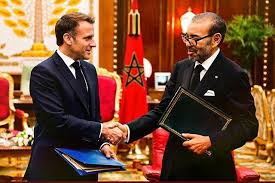The 22 new key agreements strengthening the Franco-Moroccan partnership include a contract between the Moroccan National Railways Office (ONCF) and French multinational Alstom for the supply of high-speed trains (TGV) and related support.
In a major step forward in the long-standing partnership between France and Morocco, 22 new agreements were signed today in Rabat, in the presence of King Mohammed VI and French President Emmanuel Macron.
These agreements, covering various sectors such as transport, energy and cultural cooperation, illustrate the strategic alliance between Morocco and France, while demonstrating their shared commitment to
economic and technological growth.
Among the most notable agreements is a contract signed between the Moroccan National Railways Office (ONCF) and French multinational Alstom, covering the supply of high-speed trains and related support
services.
In addition, ONCF has concluded agreements with Sistra Egis for technical assistance and Goslo Cogifer for the supply of track equipment, thus strengthening Morocco’s railway infrastructure.
These initiatives are part of Morocco’s transport modernization strategy, drawing on French expertise, and continuing the success of projects such as the Casablanca-Tangier high-speed line, inaugurated in 2018.
In the field of energy, Morocco and France have reaffirmed their shared vision of a sustainable future. Agreements signed with TotalEnergies and Safran, as well as a memorandum between the Moroccan OCP and the French Development Agency (AFD) on decarbonisation, demonstrate their commitment to environmentally friendly energy solutions.
Another significant agreement concerns the expansion of the Taza wind farm, a project that is part of Morocco’s ambition to produce 52% of its electricity from renewable sources by 2030.
This partnership is also based on Morocco’s commitment to reduce its greenhouse gas emissions by 45 per cent and to avoid building new coal-fired power plants, with the support of French companies specializing in low-carbon technologies.
The two nations also highlighted their shared priorities in civil protection, firefighting, port infrastructure, water management and agriculture.
In the education sector, a declaration of cooperation for the period 2024-2026 was signed, strengthening ties between French and Moroccan universities and promoting bilateral research.
President Macron recalled France’s role as a gateway to the European market for Moroccan companies. France also remains the top destination for Moroccan students abroad, with over 45,000 enrolled in 2023.
Morocco and France have also expanded their collaboration in the creative industry, cultural heritage and video game development, highlighting a holistic approach to the partnership, integrating modern digital sectors.
In addition, an agreement was reached for the creation of a Morocco-France investment accelerator, with the ambition of attracting mutual investments and stimulating economic opportunities in both countries.
France remains Morocco’s leading trading partner and investor in North Africa, ranking as the largest customer of Moroccan exports and the second largest supplier to the Kingdom.
Trade between the two countries reached €14.1 billion in 2023, largely thanks to Moroccan automobile exports and French sales of transport equipment and cereals.
The ties between the two countries go beyond trade. France remains the leading foreign investor in Morocco, with significant investments in the real estate, industry, trade and finance sectors.
For its part, Morocco has become the leading African investor in France, with Moroccan direct investments in France reaching 1.8 billion euros in 2022, particularly affecting strategic decision-making centres and economic co-location projects.
RT/ac/Sf/fss/gik/APA


